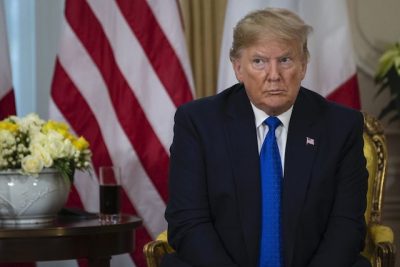Trump impeachment: Democrats unveil formal charges
The first article revealed by committee chief Jerry Nadler accuses Mr Trump of abuse of power and the second accuses him of obstructing Congress.
The president is said to have withheld aid to Ukraine for domestic political reasons.
He insists he has done “nothing wrong” and dismissed the process as “madness”.
Live updates
If the House of Representatives Judiciary Committee votes to approve the articles later this week, they will then be submitted to the lower chamber for a full vote.
If, in turn, the articles are approved by the House – which is controlled by the Democrats – an impeachment trial in the Republican-held Senate will take place, possibly early in January.
The impeachment process was launched after an anonymous whistleblower complained to Congress in September about a July phone call by Mr Trump to the president of Ukraine.
What is Mr Trump accused of?
Mr Trump “sees himself as above the law”, the committee chief said. “We must be clear, no one, not even the president, is above the law.”
Mr Nadler said the integrity of the presidential election was at stake.
In the July phone call to Ukraine’s leader, Mr Trump appeared to tie US military assistance to Ukraine launching investigations which could help him politically.
Democrats say this pressure on a vulnerable US ally constitutes an abuse of power.
The first investigation Mr Trump wanted from Ukraine was into former Vice-President Joe Biden, his main Democratic challenger, and his son Hunter. Hunter Biden joined the board of a Ukrainian energy company when his father was President Obama’s deputy.
The second Trump demand was that Ukraine should try to corroborate a conspiracy theory that Ukraine, not Russia, had interfered in the last US presidential election. This theory has been widely debunked, and US intelligence agencies are unanimous in saying Moscow was behind the hacking of Democratic Party emails in 2016.
How does impeachment work?
If the House of Representatives votes to pass articles of impeachment, the Senate is forced to hold a trial.
A Senate vote requires a two-thirds majority to convict and remove the president – unlikely in this case, given that Mr Trump’s party controls the chamber.
Only two US presidents in history – Bill Clinton and Andrew Johnson – have been impeached, but neither was convicted.
President Richard Nixon resigned before he could be impeached.



